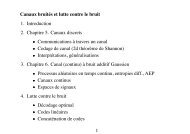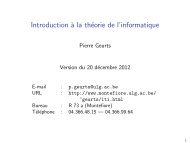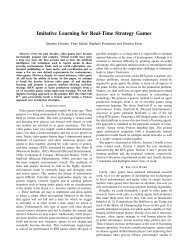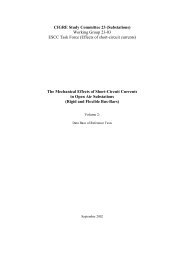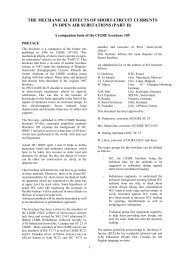Session 1 - Montefiore
Session 1 - Montefiore
Session 1 - Montefiore
You also want an ePaper? Increase the reach of your titles
YUMPU automatically turns print PDFs into web optimized ePapers that Google loves.
44<br />
Responses to urban sprawl<br />
The Thematic Strategy provides a context in which<br />
good practice experiences of cities in combating<br />
urban sprawl can be applied and developed such as:<br />
• the development of long term, consistent<br />
plans promoting sustainable development and<br />
the limitation of urban sprawl supported by<br />
monitoring and evaluation systems to verify<br />
results on the ground;<br />
• policies for the the rehabilitation of derelict<br />
brownfield sites and renovation of public spaces<br />
to assist in the creation of more compact urban<br />
forms;<br />
• policies for the avoidance of the use of greenfield<br />
sites and complementary urban containment<br />
policies;<br />
• identification of the key partners including the<br />
private sector and community, as well as local,<br />
regional and national government and their<br />
mobilisation in the planning, implementation<br />
and evaluation of urban development;<br />
• management of the urban-rural interface via<br />
cooperation and coordination between urban<br />
authorities and rural and regional authorities in<br />
promoting sustainable development.<br />
5.4.3 Cooperation in policy development<br />
Cooperation in policy development provides the<br />
third principle of good governance through which<br />
the EU can support initiatives to counter urban<br />
sprawl. At the EU level, the Commission can ensure<br />
that regional and local knowledge and conditions<br />
are fully taken into account when developing<br />
policy proposals. In particular the aim is to develop<br />
systematic dialogue and increased cooperation<br />
with European and national associations of<br />
regional and local government and other local<br />
partners including regional and city networks and<br />
other NGOs.<br />
The essentials of this approach are based on the<br />
development of a reinforced culture of consultation<br />
and dialogue, a culture which is adopted by all<br />
European Institutions. In some policy sectors,<br />
where consultative practices are already well<br />
established, the Commission could develop<br />
more extensive partnership arrangements. The<br />
mobilisation of a broad range of partners with<br />
different skills has underpinned the 'Bristol<br />
Accord' in which local partnerships including<br />
public, private, voluntary and community interests<br />
are viewed as essential to deliver sustainable<br />
communities.<br />
Such partnerships need to be developed and<br />
maintained over the long term based on flexible<br />
Urban sprawl in Europe<br />
cooperation between the different territorial levels.<br />
Regional and city networks and NGOs can in this<br />
manner make more effective contributions to EU<br />
policy development.<br />
5.5 Local urban and regional<br />
management<br />
The analysis of cities in this report confirms that<br />
the success of local planning policies and practices<br />
in restricting the physical expansion of built-up<br />
areas is critical to efforts to constrain urban sprawl.<br />
The studies have identified planning policies and<br />
practices that have successfully restricted the<br />
sprawling expansion of built-up areas. Indeed, one<br />
fifth of the cities studied increased the density of<br />
residential areas from the mid-1950s. At the local<br />
level policies of urban containment are widely<br />
used in land use planning as a means of reducing<br />
urban sprawl and preserving farmland, including<br />
policies to limit greenfield and promote brownfield<br />
development based on more or less strict land use<br />
control.<br />
Given the heterogeneity of the cities considered in<br />
this report, the array of policies and other means<br />
to limit and prevent urban sprawl is potentially<br />
extensive. Further examination of the policies and<br />
means to limit urban sprawl in these cities may<br />
therefore offer deeper insights into the nature of<br />
the effective local management of urban sprawl.<br />
The prime aim is to acquire a full understanding<br />
of the policies and practices behind the 'success<br />
stories' so that this know-how can be made<br />
available to all European cities in combating urban<br />
sprawl. The following analysis of Munich (Box 10)<br />
highlights some best practice experience that can<br />
provide catalysts for future integrated approaches<br />
to the management of urban sprawl throughout<br />
Europe.<br />
The Munich area has remained exceptionally<br />
compact when compared to many other European<br />
cities. The roots of this success may be traced to<br />
the decisions by the city's planners in the post war<br />
period to rebuild the historical centre enclosed by a<br />
combined park and traffic ring. This was followed<br />
in the early 1960s by the replacement of traditional<br />
town planning with integrated urban development<br />
planning, providing guidelines for all municipal<br />
responsibilities including economy, social issues,<br />
education, culture as well as town planning.<br />
By the 1990s comprehensive planning concepts<br />
were firmly established, based on an integrated






